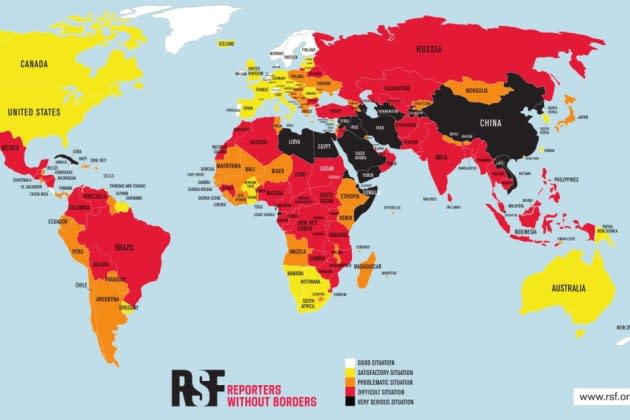World Press Freedom Index Ranks China Near Last, Cites ‘Grave Threat’ to Hong Kong Journalism

Reporters Without Borders (RSF) ranked China fourth to last out of 180 countries on its 2021 World Press Freedom Index on Tuesday, while warning that Hong Kong journalism is also now under “grave threat.”
China ranked 177th in 2019, 2020 and 2021, down from a period at 176th from 2015 to 2018. It currently rates higher only than the totalitarian countries of Turkmenistan, North Korea and Eritrea, which for years have come in last.
More from Variety
Italy Abolishes Film Censorship, Ending Government Power to Ban Movies
China Imposes New Rules to Restrict Independent Online Content Creators
Beijing “continues to take Internet censorship, surveillance and propaganda to unprecedented levels,” said the report, which annually evaluates changes to local conditions for journalists. It added: “Beijing has taken advantage of the COVID-19 pandemic to enhance its control over online information even more.”
China also remains among the world’s biggest jailer of journalists. Seven journalists are still being held for their pandemic coverage, and more than 450 social media users were briefly arrested for sharing “false rumors” about the event, according to RSF. More than 120 defenders of press freedom are currently detained.
Meanwhile, “Beijing can now interfere directly under the National Security Law (NSL) it imposed in June 2020, which poses a grave threat to journalism,” RSF said, describing a “censorship virus [that has] spread beyond China.”
In the previous 2020 World Press Freedom Index, Hong Kong’s ranking fell seven places to 80th place due to its treatment of journalists during pro-democracy demonstrations there. This year, it remained at 80th — just behind Kosovo and Kyrgyzstan and ahead of Malta — despite the new NSL that makes political dissent effectively impossible.
RSF East Asia bureau chief Cedric Alviani explained that a major reason that the territory’s ranking remained unchanged was simply that authorities had not had the opportunity over the past year to act violently towards journalists, as the pandemic and the NSL kept protests off the streets. The current index also does not yet taken into account threats to press freedom over the past few months.
“I’d say this is the calm before the storm,” Alviani told the Hong Kong Free Press. “So far, it’s still possible for journalists to do their work in Hong Kong. It’s just that the potential threat is higher and higher.”
Jimmy Lai, the founder of the pro-democracy paper Apple Daily and a past recipient of RSF’s Press Freedom Prize, was sentenced to 14 months in prison last Friday, and is now facing further charges of “colluding with foreign forces” that carry a maximum penalty of life imprisonment. Lai’s trials are a “very bad signal” for the city’s press freedoms, and are only the first signs of the NSL’s effects on media there, said Alviani.
Meanwhile, public broadcaster Radio Television Hong Kong (RTHK) has seen its editorial independence strongly restricted and is undergoing strong government pressure to toe the official line. An RTHK freelance producer is currently awaiting a verdict after her trial for seeking public vehicle license plate information during an investigation into police inaction during mob attacks that occurred during the 2019 pro-democracy protests. She could receive up to two years in prison.
More broadly, RSF warned that authoritarian regimes in the Asia-Pacific region have used the pandemic to “perfect their methods of totalitarian control of information,” while “dictatorial democracies” have used it as “a pretext for imposing especially repressive legislation.”
Alviani explained to Time magazine: “The Asia-Pacific has a tradition of being a very difficult region for press freedom and in recent years there’s been a downfall in almost every territory.
“We can see the influence of China in the background, because several of these countries have adopted regulations that are almost copy and pasted from China, like control of the internet and anti-fake news regulations.”
Out of all countries globally, Malaysia fell the furthest in RSF’s new rankings, dropping 18 places to hit 119th. It recently issued an “anti-fake news” decree that facilitates crackdowns on critical journalism under the guise of stopping the spread of misinformation.
More broadly, the report found that journalism was totally blocked or seriously impeded in 73 countries and constrained in 59, together making up 73% of countries under consideration. Only 12 out of the 180 countries, or 7%, were found to offer a favorable environment for journalism, down 1% from last year.
Best of Variety
Sign up for Variety’s Newsletter. For the latest news, follow us on Facebook, Twitter, and Instagram.

 Yahoo Finance
Yahoo Finance 